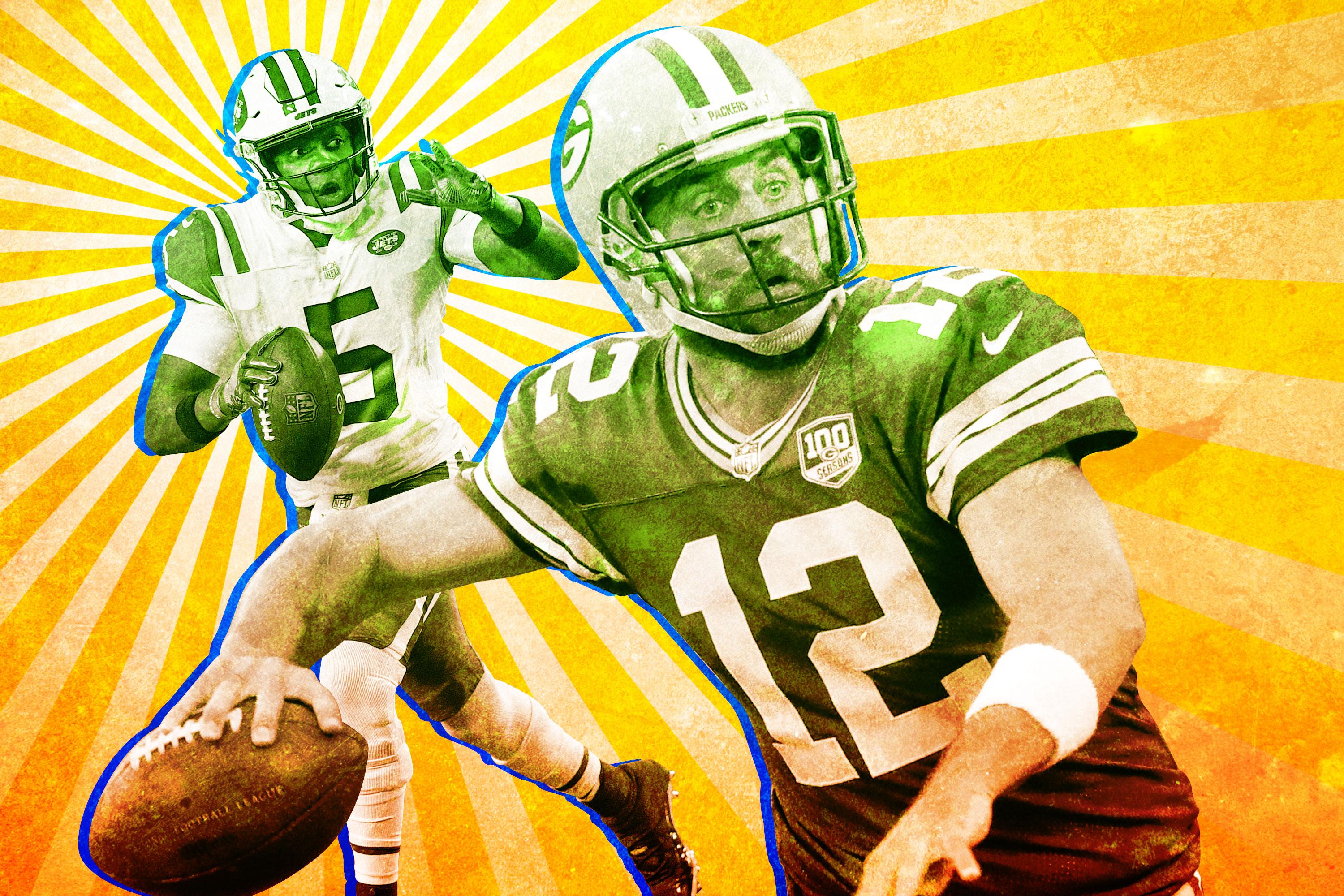
Quarterback salaries are a succinct way to teach someone that life is not fair. There is no good reason Eli Manning should make more guaranteed money than Odell Beckham Jr., but he does because he’s a quarterback. The same will probably be true whenever Khalil Mack gets paid something less than Derek Carr. Case Keenum will make the exact same money as J.J. Watt this season.
Even within the world of quarterbacks, there is little order to things: Jimmy Garoppolo, Matthew Stafford, Derek Carr, and Joe Flacco are not the four best quarterbacks in the NFL, but they were set to be the four highest-paid quarterbacks this season — before today.
That’s because today, for however briefly, the financial hierarchy makes sense: Aaron Rodgers is the highest-paid quarterback in the world.
On Wednesday, Rodgers finalized a new deal that guarantees him $103 million and will keep the 34-year-old in Green Bay through 2023. Rodgers kept his promise to deliver details of the news to former Packers receiver James Jones, who now works for NFL Network and was the first to report the impressive details. ESPN says the deal can be worth up to $180 million. Rodgers will receive $67 million before the end of the year and an additional $13 million before next spring. He joins Matt Ryan as the only other player on a contract worth $100 million guaranteed, though Ryan’s deal is for five years and maxes out at $150 million.
The Rodgers contract does two things: It creates cost certainty for the Packers’ salary cap situation, and it makes Rodgers a very rich man. The dollar value is notable, but there are no opt-outs, nothing tied to a percentage of the salary cap, and nothing that adjusts the contract if he’s not the highest-paid quarterback, all of which had been speculated by the media in recent weeks. As far as the structure goes, this one won’t break the mold. Rodgers said last week that his goal for the deal was to make both sides happy, and it accomplishes that. Rodgers will make more money from the sport of football than any player ever, and the Packers didn’t have to fundamentally change the sport to do it.
The lesson we learned on Wednesday is the lesson we learned over the summer when Ryan signed his deal, in the spring when Kirk Cousins signed his deal, or when Matthew Stafford signed his deal last summer. There is no quarterback bubble; the price for a quarterback is not flattening or falling. Rodgers’s eye-popping salary number, like all quarterback numbers, will look normal within a few years or sooner as the salary cap continues to rise by around $10 million each season. Despite what Josh Norman told me the league should do, there will not be an official or unofficial cap on quarterback pay. There are two NFLs: quarterbacks and the rest of the league. Don’t try to compare the numbers; you’ll just end up more confused than when you started.
The Philadelphia Eagles were the 1-seed in the NFC because they had an MVP candidate at quarterback in Carson Wentz, and they won the Super Bowl because they had a very good backup. Nick Foles likely cannot replicate his Super Bowl MVP–winning performance (373 yards, three touchdowns) over 16 games, but it doesn’t matter because their insurance policy already paid out. It might seem like the Eagles won the Super Bowl because quarterbacks are replaceable, but really they won because they had two good ones. Now, everyone else is following suit.
The Saints sent a third-round pick to the Jets on Wednesday for Teddy Bridgewater and a sixth-rounder. The Saints, of course, have Drew Brees, so Bridgewater will be the backup. Bridgewater will be an NFL starter again, though; he was good with the Vikings and looked good enough with the Jets to start for a lot of NFL teams. If this weren’t such an unusual year, one in which nearly every team mapped out a defensible plan at quarterback months ago, Bridgewater would be starting for someone this season. He is signed only through this year, so barring a big extension for him (which is unlikely given that Brees’s cap number is $33.5 million), New Orleans just gave up a fairly high pick for a very nice one-year insurance policy. A few years ago, Tom Moore, then the offensive coordinator for the Indianapolis Colts, told Ron Jaworski how teams used to view their backup quarterbacks. Jaworski and Jon Gruden asked Moore why Peyton Manning’s backup never gets snaps in practice. Moore said that if Manning went down, the team was “fucked. And we don’t practice fucked.” In essence, teams are now practicing fucked.
So now we wait for NFL teams to do what they always do: keep allocating more and more capital to quarterbacks. Former NFL executive Joe Banner said that as the cap nears $200 million (it was around $100 million just six years ago), “nobody should be surprised by the size of these deals and ones that will be completed soon.” Rodgers will go down as the first quarterback to get this much money, but it won’t take more than a few seasons for him to be surpassed by a lesser quarterback (since almost everyone else is a lesser quarterback).
Jason Fitzgerald of Over the Cap said that Rodgers’s deal reminds him of the Green Bay passer’s 2013 deal, where he “takes a contract that really doesn’t push the market enough.” That deal, he said, is why most quarterback deals were stuck together for a few years — mostly between $15 million and $20 million. Cousins’s and Ryan’s deals pushed the market into the mid-20s over the length of their deals. Rodgers will average over $30 million in each year of his deal. Right now, it’s a historic amount of money. By the end of his four-year extension, Rodgers’s deal will not even look all that wild given how much the cap will rise. Hell, even by today’s standards it’s worth it:
When it comes to paying quarterbacks, there are two ways to win: One is to not do it (hopefully this entails a productive player on a rookie deal) and win with a deep roster built with the money you would have paid your quarterback. The other is to pay your quarterback everything, but have that quarterback be someone like Rodgers, who’s good enough to make up for a thinner roster. There will be about a $33 million disparity between what the Cowboys and Packers pay their quarterbacks, and both approaches can make sense. The Packers had no choice but to pay Rodgers, because the eventual alternative was something no team has done in the modern era: willingly let go of a quarterback without a concrete plan to replace him. It has never happened. And that’s not likely to change anytime soon.
